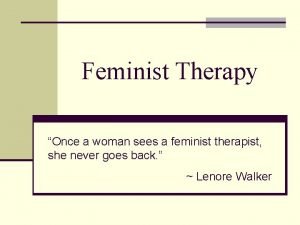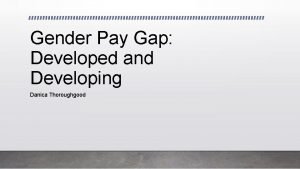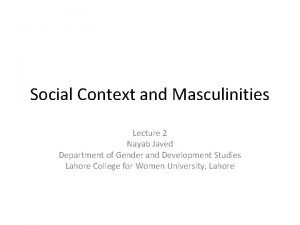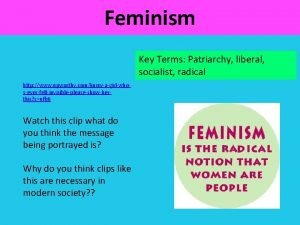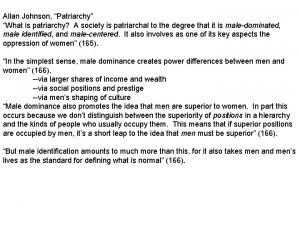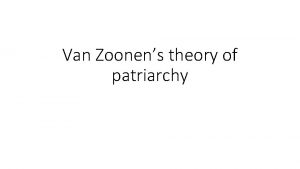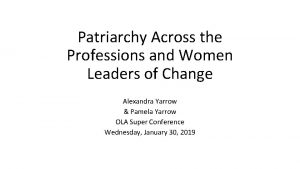Sacrificing women to fight the patriarchy Supporting students
















- Slides: 16

Sacrificing women to fight the patriarchy? Supporting students and mediating tensions between gender equity and cultural relativism CAPHIA Teaching and Learning Forum, ANU, 16 July 2019 Devin Bowles CAPHIA ANU Medical School Elisabeth Schuele Divine Word University Advancing Public Health Education, Research and Workforce Development caphiaed@gmail. com www. caphia. com. au (02) 6171 1306

Workshop overview • Two stories from Australia • Brief observations on student psychology and Australian higher education • The situation in Papua New Guinea • Insights from the larger group Advancing Public Health Education, Research and Workforce Development caphiaed@gmail. com www. caphia. com. au (02) 6171 1306

• Observations • • • This student was near the end of a MPH The education system had not worked as it should to that point Education system often not well‐ configured to really assist similar students I hadn’t previously taught this student, but on reflection I had probably not done enough to intervene with similar students Advancing Public Health Education, Research and Workforce Development caphiaed@gmail. com www. caphia. com. au (02) 6171 1306

Australian higher education • • Prioritises (or claims to prioritise) independent thinking Conceiving and asserting one’s own thoughts may be linked to two psychological traits • • • Self‐esteem Locus of control These traits appear to be linked (Judge et al 2002) Advancing Public Health Education, Research and Workforce Development caphiaed@gmail. com www. caphia. com. au (02) 6171 1306

Self-esteem • • • A person’s idea of her or his worth The association between self‐esteem and specific domains of self‐esteem (eg. family, friend and financial satisfaction varies across cultures) (Deiner and Deiner 2009) Family and influences are important (Allen et al 1994) Advancing Public Health Education, Research and Workforce Development caphiaed@gmail. com www. caphia. com. au (02) 6171 1306

Locus of control • A person’s belief about who/what is responsible for what happens to them • Internal versus external – continuum • Varies across cultures (Nowicki, Stephen, and Klaus Schneewind) • Family environment is important for individual development (Marks 1998) Advancing Public Health Education, Research and Workforce Development caphiaed@gmail. com www. caphia. com. au (02) 6171 1306

Durability and investment • • Self‐esteem and locus of control are understood to be personality traits, and therefore relatively enduring This could limit the opportunity to work with students to improve their self‐esteem In turn, this could mean that students who feel that they are not authorised or worthy of presenting their own ideas are likely to stay that way This assumes a link between self‐esteem and a feeling of entitlement to have and present one’s own views Advancing Public Health Education, Research and Workforce Development caphiaed@gmail. com www. caphia. com. au (02) 6171 1306

The situation in PNG Patrilineal and matrilineal societies Matrilineal: Women own the land, decisions concerning land by women, children belong to her clan, has a VOICE • Chiefs are men – history, mediations, conflicts, maternal uncle very important to support his niece Patrilineal: • Men present in public sphere, politics, • Women in domestic sphere, have no role in the public • Polygamy practiced and excepted in some areas • Advancing Public Health Education, Research and Workforce Development caphiaed@gmail. com www. caphia. com. au (02) 6171 1306

PNG women returning from Postgraduate Studies • Recognition of achievement by family, society, respect • Cultural expectations, role in society has not changed • Increase financial autonomy • Workplace: resistance or high expectation, high performance – measured! Advancing Public Health Education, Research and Workforce Development caphiaed@gmail. com www. caphia. com. au (02) 6171 1306

Postgraduate degree from Australia Gender‐based unequal power relations • • • Relationship with partner: Clash with traditional values supporting his superiority and rights, control, including men’s right to beat wives Husband wife: equal academic level or she has higher academic level Result: violence Serious for educated women Difference in matrilineal and patrilineal cultures? Advancing Public Health Education, Research and Workforce Development caphiaed@gmail. com www. caphia. com. au (02) 6171 1306

Resilience of PNG women Locus of control • • Importance of family background and upbringing Ability to work through issues together or Remain in oppressive relationships or Breakdown of relationship, many women become bitter/hard Advancing Public Health Education, Research and Workforce Development caphiaed@gmail. com www. caphia. com. au (02) 6171 1306

Do you think that it is more difficult to engage women from highly patriarchal cultures to express their own ideas? If so, how has it manifested in your classrooms? If not, please provide context Advancing Public Health Education, Research and Workforce Development caphiaed@gmail. com www. caphia. com. au (02) 6171 1306

To what extent is it possible to increase students’ confidence in their ideas if they have grown up in families and cultures which devalue them? Interested in stories of success and stories of ‘failure’ It would be good to get an understanding of whethere is a standard trajectory of increasing confidence, and what can universities do to enhance these Advancing Public Health Education, Research and Workforce Development caphiaed@gmail. com www. caphia. com. au (02) 6171 1306

When students come from patriarchal cultures, does an increase in self‐confidence result in poorer relationships with their families and communities, and do these recover? Is there a level of increased confidence which actually diminishes students’ overall wellbeing? Advancing Public Health Education, Research and Workforce Development caphiaed@gmail. com www. caphia. com. au (02) 6171 1306

In the face of grave information deficits about individual students’ circumstances, how can lecturers most ethically help their students? Advancing Public Health Education, Research and Workforce Development caphiaed@gmail. com www. caphia. com. au (02) 6171 1306

References Allen, Joseph P. , et al. "Longitudinal assessment of autonomy and relatedness in adolescent‐family interactions as predictors of adolescent ego development and self‐esteem. " Child development 65. 1 (1994): 179‐ 194. Diener, Ed, and Marissa Diener. "Cross‐cultural correlates of life satisfaction and self‐esteem. " Culture and well-being. Springer, Dordrecht, 2009. 71‐ 91. Judge, Timothy A. , et al. "Are measures of self‐esteem, neuroticism, locus of control, and generalized self‐efficacy indicators of a common core construct? . " Journal of personality and social psychology 83. 3 (2002): 693. Marks, Lawrence I. "Deconstructing locus of control: Implications for practitioners. " Journal of Counseling & Development 76. 3 (1998): 251‐ 260. Nowicki, Stephen, and Klaus Schneewind. "Relation of family climate variables to locus of control in German and American students. " The Journal of Genetic Psychology 141. 2 (1982): 277‐ 286. Advancing Public Health Education, Research and Workforce Development caphiaed@gmail. com www. caphia. com. au (02) 6171 1306
 The fight for women's suffrage readworks answer key
The fight for women's suffrage readworks answer key Characteristics of patriarchy
Characteristics of patriarchy Romeo and juliet important quotes act 2
Romeo and juliet important quotes act 2 Characteristics of patriarchy
Characteristics of patriarchy Patriarchy
Patriarchy Sexism is interwoven with patriarchy
Sexism is interwoven with patriarchy Gittins age patriarchy
Gittins age patriarchy Nayab javed
Nayab javed Patriarchy
Patriarchy Champion of filipino students ilipino students
Champion of filipino students ilipino students Hát kết hợp bộ gõ cơ thể
Hát kết hợp bộ gõ cơ thể đặc điểm cơ thể của người tối cổ
đặc điểm cơ thể của người tối cổ Cái miệng nó xinh thế chỉ nói điều hay thôi
Cái miệng nó xinh thế chỉ nói điều hay thôi Mật thư anh em như thể tay chân
Mật thư anh em như thể tay chân Tư thế worm breton
Tư thế worm breton ưu thế lai là gì
ưu thế lai là gì Tư thế ngồi viết
Tư thế ngồi viết



